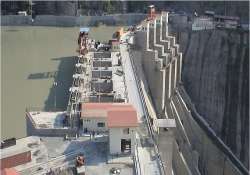Pak Indus Commission inspects hydro projects in Kashmir
New Delhi, Jun 1: A team of Pakistan Indus Water Commission made a quiet three-day visit to Jammu and Kashmir to inspect the various projects being undertaken by India over Indus basin rivers as part

New Delhi, Jun 1: A team of Pakistan Indus Water Commission made a quiet three-day visit to Jammu and Kashmir to inspect the various projects being undertaken by India over Indus basin rivers as part of an annual exercise.
The team, led by Pakistan Indus Commissioner Asif Baigh, inspected the Wullar barrage and later visited the 330 MW Kishenganga power project earlier this week.
The Pakistani delegation today left for their country.
India and Pakistan are engaged in an international arbitration at the Permanent Court of Arbitration at The Hague. While the court has given a partial award favouring New Delhi, its final order will be issued later this year.
The team, accompanied by Indian officials, also inspected the existing water level in the river Jhelum.
The team from Indian side is slated to visit Pakistan in September this year, sources said.
At the time of independence, the boundary line between India and Pakistan was drawn right across the Indus Basin, leaving Pakistan as the lower riparian.
A dispute arose between two countries regarding the utilisation of irrigation water from existing facilities.
Negotiations held by by the International Bank for Reconstruction and Development (World Bank), culminated in the signing of Indus Waters Treaty in 1960.
The annual visits are part of the provisions of the treaty.
Out of the six rivers in the Indus basin, India has exclusive rights over the waters of the three major Eastern rivers—Ravi, Beas and Sutlej before they enter Pakistan, while Pakistan has rights to three large Western rivers that first flow through Jammu and Kashmir—Indus, Jhelum and Chenab.
The team, led by Pakistan Indus Commissioner Asif Baigh, inspected the Wullar barrage and later visited the 330 MW Kishenganga power project earlier this week.
The Pakistani delegation today left for their country.
India and Pakistan are engaged in an international arbitration at the Permanent Court of Arbitration at The Hague. While the court has given a partial award favouring New Delhi, its final order will be issued later this year.
The team, accompanied by Indian officials, also inspected the existing water level in the river Jhelum.
The team from Indian side is slated to visit Pakistan in September this year, sources said.
At the time of independence, the boundary line between India and Pakistan was drawn right across the Indus Basin, leaving Pakistan as the lower riparian.
A dispute arose between two countries regarding the utilisation of irrigation water from existing facilities.
Negotiations held by by the International Bank for Reconstruction and Development (World Bank), culminated in the signing of Indus Waters Treaty in 1960.
The annual visits are part of the provisions of the treaty.
Out of the six rivers in the Indus basin, India has exclusive rights over the waters of the three major Eastern rivers—Ravi, Beas and Sutlej before they enter Pakistan, while Pakistan has rights to three large Western rivers that first flow through Jammu and Kashmir—Indus, Jhelum and Chenab.